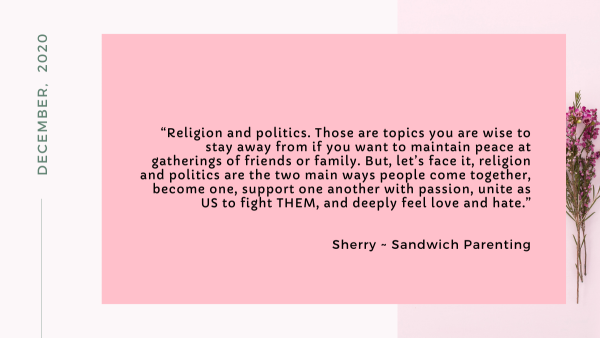The Power of Prayer
This article was posted on our original blog at Healing from Complex ptsd, December 2nd 2020.
- Linda Meredith (via Twitter)

She nodded.
I’ve always feared feeling too much. Love, hate, fear, anger, happiness, sadness… you name it, any feeling that can get extreme, I avoid. Religion brings out a lot of feelings. I tried one religion twice in junior high and at university. The group activities built a sense of community that I loved, feeling controlled made me recoil, believing that my loved ones were going to hell because they grew up in a different environment was frightening, the injustice of a baby born with original sin made me angry, singing with the choir gave me a high, and of course the cognitive dissonance of it all caused me existential depression. Fun times.
As is my way, I chose to escape it.
“As humans, I think we need to believe and have faith. But I dislike how the powerful manipulate that need, using it to gain money and control.”
She continued to give me a safe space to articulate my thoughts with a warm smile and encouraging nod.
When I was a child, we went to Buddhist temples. My Chinese birth-date falls on the day celebrated as the birthday of Guan Yin, or the Goddess of Mercy. So I was always told that I had yuan feng (rapport, destiny) with Guan Yin. The smoke of the thick sweet intense was not comforting to me, as I associated it with death.
The chanting of the monks sounded more eerie rather than comforting. I just could not believe something that I didn’t understand.The chanting and meditation were supposed to do good things, like help us pass exams or prevail over illnesses. In my youthful arrogance, these asks were just so… selfish and meaningless. Ling shi bao fo jiao was a phrase that often popped in my head: last-minute throwing oneself at the foot of Buddha, begging for help. It smacked of not doing your work and then asking to be taken care of. That was how I used to feel about prayer.
“The more I see, the more I realize that we need both faith and hope.”
She smiled and replied, “Yes, I agree completely.”
This conversation shed light on how much my ambivalence towards a greater power has robbed me of one of the most potent ways we get through difficult times. Knowing that we are never alone, that something or someone will ALWAYS be there to support you with love, that this something or someone has helped countless other people through dark times, that there is ALWAYS hope – – what a powerful feeling.
Faith is having trust in the existence of something without physical proof that it is there. Hope is having the trust that we will get there even though we aren’t there yet. Faith is saying it’s here. And hope is saying it’s there, and we may need to get through some tough times with hard work, but we will get there, together.
I once scoffed at faith, because it seemed so naïve. But now I realize that faith goes hand in hand with hope. While hope keeps us doing the hard work until we see results, faith keeps us going without the proof.
In this world of instant gratification, Google, and credit cards, many of us haven’t learned to excel in life by building all the small pieces that become the strong foundations of integrity, trust, compassion – in relation to ourselves or others. We no longer can hold that feeling of need or want without desiring it to be quenched and resolved right away. We are unable to stand that feeling of emptiness because it feels so hopeless. That is to say, the narrative in our heads is “here we go again” rather than “I know how I want to handle this one.”
Religion and politics give answers. Religion and politics give us rules, but also hope that other people are doing things to fix the bad stuff. The problem is that religion and politics are run by… human beings – and human beings… are not perfect. And therefore – while we will see wonderful things done by people in religion and politics, we will also see terrible things done by them.
- Steven Weinberg (via Twitter)
My question is: Is it possible to extract only the positives involved with religion and politics without the negatives?
For me, that ignited a newfound desire to try to do that with the Heart Mantra associated with Guan Yin. I’ve always struggled with a bad memory and a fear of showing the world my secret flaw that has made everything I do so hard. I cannot use memorization to get anything important done.
But faith and hope encourage us to do things that are good for us even when it’s difficult. Like dealing with stress. Like changing bad coping mechanisms. Like quitting the addictive allure of a soothing but unhealthy activity or substance.
I burst out, “I don’t drink, I don’t smoke, I don’t do drugs. I eat. It’s my drug, it’s my coping mechanism to deal with stress. It’s my addiction.”
“If you don’t mind, I’d like to suggest to you to pray for self-discipline.” She suggested in response.
Prayer. That used to be a triggering word for me. I would flinch a tad because it seemed like such a futile activity. “Sending prayers and thoughts.” Or, You are imposing your beliefs on me by telling me that your God will answer your prayers to help me. But over time, I’ve come to the conclusion that we all have the right to label the power of intentional thoughts with whatever words work for us. I tried using “Sending you warm thoughts and healing hugs” which doesn’t quite comes across as well as prayers to a greater being, but it was what I was comfortable with.
But when she asked me to pray, I thought, Wait a minute, I have a prayer that is mine! It is my birth right. I just never wanted to memorize it because I couldn’t memorize a short mantra while kids from Taiwan used to memorize hundreds of history BOOKS. I felt shame and guilt about this. I tossed it aside because I didn’t believe in the power of the mantra, nor did I believe that I could do it. Which one was the real reason? No matter, they both contributed to my wanting to run away.
So, now, I am starting a new journey.
I have broken down the mantra into small pieces, four phrases a day (and if it takes me two days, I’ll be kind to myself and shift everything over by another day). I will memorize this mantra and use it as a prayer when I’m anxious. I will use it to pray for others. I will use it to pray for self-discipline when I want to overeat. I will use it to give me strength from a greater power. I will turn to my mantra to remember that I’m not alone and that I can do this.
Avalokiteshvara Bodhisattva, when deeply practicing prajna paramita, clearly saw that all five aggregates are empty and thus relieved all suffering.
Shariputra, form does not differ from emptiness, emptiness does not differ from form. Form itself is emptiness, emptiness itself form. Sensations, perceptions, formations, and consciousness are also like this.
Shariputra, all dharmas are marked by emptiness; they neither arise nor cease, are neither defiled nor pure, neither increase nor decrease.
Therefore, given emptiness, there is no form, no sensation, no perception, no formation, no consciousness; no eyes, no ears, no nose, no tongue, no body, no mind; no sight, no sound, no smell, no taste, no touch, no object of mind; no realm of sight … no realm of mind consciousness.
There is neither ignorance nor extinction of ignorance… neither old age and death, nor extinction of old age and death; no suffering, no cause, no cessation, no path; no knowledge and no attainment.
With nothing to attain, a bodhisattva relies on prajna paramita, and thus the mind is without hindrance. Without hindrance, there is no fear. Far beyond all inverted views, one realizes nirvana.
All buddhas of past, present, and future rely on prajna paramita and thereby attain unsurpassed, complete, perfect enlightenment.
Therefore, know the prajna paramita as the great miraculous mantra, the great bright mantra, the supreme mantra, the incomparable mantra, which removes all suffering and is true, not false.
Therefore we proclaim the prajna paramita mantra, the mantra that says: “Gate Gate Paragate Parasamgate Bodhi Svaha.
Sources: Translation by a team of translators who participated in the Soto Zen Translation Project, highlights and links from The Heart Sutra Part 1: Introduction to the Most Common Mahayana Text – The Zen Studies Podcast
What is your relationship with prayer?
Courses
Let's Create Generational Change Together
To support this goal, Healing from Complex Ptsd allows you to:
- Access professional education and business support from industry leaders
- Learn a results driven approach to CPtsd recovery
- Discover a full library of ready to use tools and resources
Popular courses
Terms and Conditions
Developmental Trauma Self-Check
Over the past 12 months, how many and how often have you noticed:
-
I work hard to hold it together in public, then crash in private.
-
I struggle to name what I feel until it overloads me.
-
I say yes to keep the peace, then feel resentful or empty.
-
I feel loyal to people who do not treat me well.
-
I lose time or feel foggy when stressed.
-
I avoid closeness or over-attach quickly, then panic.
-
I find it hard to trust my own judgement.
-
I feel shame when I try to set boundaries.
-
I need external approval to feel steady.
-
I push through fatigue instead of pausing.
How to use this:
0–3 items often: you may be using a few survival patterns.
4–7 items often: consider paced support to rebuild safety and choice.
8–10 items often: a trauma-trained professional can help you restore stability and connection.
Brain Impact Self-Check
Over the past 12 months, how often have you noticed:
-
My mind jumps to what could go wrong, even in safe moments.
-
I find it hard to remember recent details when I am stressed.
-
Decisions feel risky, so I delay or avoid them.
-
I forget good experiences quickly and dwell on the bad.
-
I feel numb or overwhelmed, with little in-between.
-
I lose words when emotions rise.
-
I misread neutral faces or tones as negative.
-
I struggle to notice body signals like hunger, tension or breath.
-
I do better when someone I trust is nearby.
-
I feel different “versions” of me in different settings.
How to use this:
0–3 often: some protective habits; gentle self-care may help.
4–7 often: consider trauma-trained coaching to build daily brain skills.
8–10 often: a paced, brain-based plan can restore clarity, memory and confidence.
For formal assessment, use recognised measures:
-
ACE-IQ or ACE-10 for adversity history (education only on public pages).
-
ITQ (International Trauma Questionnaire) for ICD-11 PTSD/Complex PTSD.
-
DERS for emotion regulation, DES-II for dissociation, PCL-5 for PTSD symptoms.
-
PHQ-9, GAD-7 for mood and anxiety; OSSS-3 for social support.

